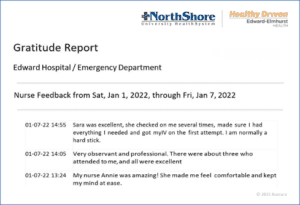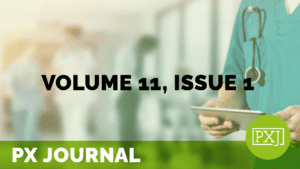Gratitude: A Glimmer of Sunshine in the Covid Storm

Most frontline healthcare workers have reported being unhappy in their jobs for some time. Studies published before the pandemic indicated that 80% of emergency nurses and 65% of emergency physicians displayed one or more hallmark signs of burnout – compassion fatigue, cynicism, and inadequacy. Nurses who suffer from burnout experience mental and emotional exhaustion, making them feel detached from their peers and their patients and less engaged at work. Asking any nurse or doctor why they wanted to go into healthcare usually results in the consistent answer, “To help people.” A Medscape 2021 survey of 18,000 doctors revealed that the most rewarding part of their job was “knowing that I’m making the world a better place.”
Unfortunately, the second year of the Covid pandemic ended with emergency department volumes 20% above baseline and nurse staffing 20% below due to some retiring early and others transitioning to less-demanding jobs.

In addition to helping diminish the feeling of burnout, regular delivery of praise is also an effective retention strategy. Even more important than salary in most cases, feeling needed and appreciated plays an integral role in job performance and care quality.
Both expressing and receiving gratitude can inspire frontline workers to be happier, kinder and remember why they become medical professionals in the first place
Author Bio:
Tom Scaletta, MD, is a practicing emergency physician board certified in clinical informatics and past president of the American Academy of Emergency Medicine. To address next-day blind spots in patient wellbeing and experience, Tom founded Auscura, a technology company focusing on automating patient communication. The platform was described in the Journal of Emergency Nursing as “the evolution of ED callbacks,” and its Gratitude Reportis a valuable feature.
Related content
-
 Culture & Leadership | Environment & Hospitality | Staff & Provider Engagement
Culture & Leadership | Environment & Hospitality | Staff & Provider EngagementUnexpected Healers Create Moments that Matter for Patients and Families
As healthcare healers, we touch many lives. Many of our patients and their families are thankful for this and reach out to share gratitude in many ways. They send notes, fill out focused recognition cards, respond to mailed surveys or utilize our Sutter Health new online feedback form. Often in healthcare we think of our
Learn more -
 Culture & Leadership
Culture & LeadershipLooking Back to Move Forward: The Next Decade and Beyond for Human Experience
This issue comes out at an important moment for the experience conversation. It was ten years ago from the publication date of this issue on April 30, 2014, that the first issue of Patient Experience Journal (PXJ) was released. PXJ was intended to be a gathering place. A virtual town square for the experience movement where
Learn more -
 Culture & Leadership | Staff & Provider Engagement
Culture & Leadership | Staff & Provider EngagementEscalation Management: The Journey to Support a Culture of Mutual Respect
Addressing incivility and workplace violence is often challenging for healthcare organizations. Increasing concerns about a rise in incivility has the potential to diminish organizational trust and threaten safety and quality of care. This webinar will describe the development of escalation management training that supports colleagues in maintaining a culture of safety that preserves the caring
Learn more
